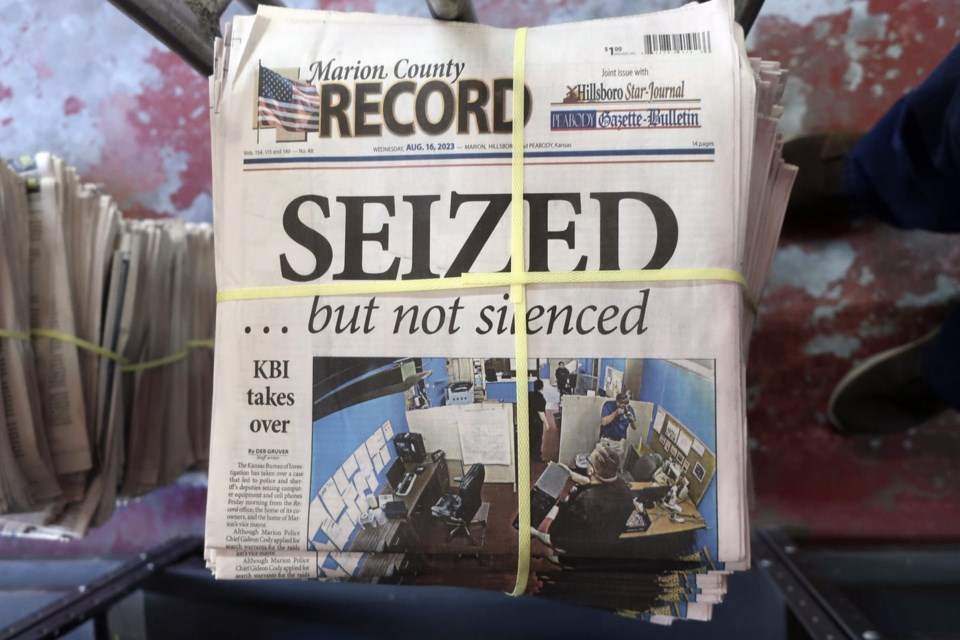TOPEKA, Kan. (AP) — Two special prosecutors said Monday that they plan to file a criminal obstruction of justice charge against a former central Kansas police chief over his conduct following a raid last year on his town's newspaper.
In an lengthy report summarizing the findings of their investigation, the special prosecutors, Sedgwick County District Attorney Marc Bennett and Riley County Attorney Barry Wilkerson, note that the staff of the newspaper that was raided, the Marion County Record, committed no crimes.
It wasn't clear whether they planned to charge former Marion Police Chief Gideon Cody with a felony or a misdemeanor, and either is possible. The prosecutors also hadn't filed their criminal case as of Monday. It could be days before they file it because they were working with the Colorado Bureau of Investigation, which stepped in at the request of its Kansas counterpart.
There was no immediate response to a voicemail left at a possible cellphone number for Cody, and it wasn't clear who might be representing him in the potential criminal case. Attorneys defending Cody in federal lawsuits that were filed over the raid did not immediately reply to a message seeking comment.
The prosecutors detailed events before, during and after the Aug. 11, 2023, raid on the Record and the home of its publisher, Eric Meyer. The report suggested that Marion police, who were led at the time by Cody, conducted a poor investigation that led them to “reach erroneous conclusions” that Meyer and reporter Phyllis Zorn had committed identity theft or other computer crimes.
But the prosecutors concluded that they have probable cause to believe that Cody obstructed an official judicial process. They said two pages of a written statement made by a business owner following the raid were not submitted to investigators with the rest of the statement in September 2023, about six weeks after the raid. Cody had accused Meyer and Zorn of identity theft and other computer crimes related to the business owner's driving record to get warrants for the raid.
The report also makes a passing reference to text messages between Cody and the business owner after the raid. The business owner has said that between them, fearing people could get wrong ideas about their relationship, which she said was professional and platonic.
“The findings will be incorporated into charges which will be sought in Marion County District Court,” the special prosecutors wrote in their report.
Bennett and Wilkerson concluded that neither Meyer nor Zorn committed any crimes in verifying information in the business owner’s driving record through a database available online from the state. Their report suggested Marion police conducted a poor investigation to “reach erroneous conclusions.”
The raid sparked a national debate about press freedoms focused on Marion, a town of about of about 1,900 people set among rolling prairie hills about 150 miles (241 kilometers) southwest of Kansas City, Missouri. Cody resigned as chief in early October, weeks after officers were forced to return materials seized in the raid.
Meyer's 98-year-old mother Joan Meyer, who co-owned the paper and lived with him, died the day after the raid from a heart attack. Meyer attributed her death to the stress of the raid.
A felony obstruction charge could be punished by up to nine months in prison for a first-time offender, though the typical sentence would be 18 months or less on probation. A misdemeanor charge could result in up to a year in jail.
___
This story was updated to correct the spelling of Sedgwick County, which had been misspelled “Segwick."
John Hanna, The Associated Press




